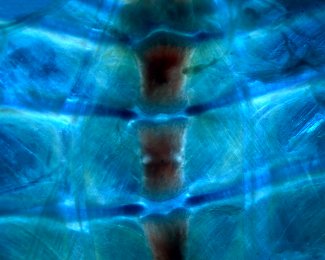
|
|||||||||||||
About KOMP Phenotyping PilotThe NHGRI and NCRR have recently funded the KOMP Mutagenesis Project and the KOMP Repository to create and characterize 312 unique mutant lines from targeted ESCs developed by the CHORI-Sanger-UC Davis and Regeneron consortium. This mouse production and phenotyping effort, led by Kent Lloyd, at UC Davis, and Pieter de Jong, with David West, at Children’s Hospital of Oakland Research Institute (CHORI) will contribute a significant number of live mutants, along with phenotype data, to the scientific community in order to stimulate additional research with these reagents. The phenotype screen includes LacZ reporter gene tissue distribution in 312 mutant lines; and fertility & viability, necropsy, behavioral phenotypes and a comprehensive analysis of compensatory tanscriptome changes in -/- mice in multiple tissues for 100 of these mutants. The tissue pattern of LacZ expression will inform those tissues selected for more detailed analyses of gene expression. Mice created for this project will be available under the standard terms and conditions for live and cyropreserved mutants from the KOMP Repository as soon as they are produced. And the phenotype data will be made available through a web portal at the KOMP website. We are currently selecting genes for mutant production and you can NOMINATE YOUR GENE here!
KOMP Phenotyping PlanIn late 2009, feedback from a survey sent to ~2500 researchers across the United States ( click here to see a summary of feedback and recommendations ), an NIH request for information (RFI), and a National Phenotyping Conference held in Bethesda all attested to the need for a concerted, centralized, high-throughput phenotyping effort to extend the scientific value of the knockout ES cell resources generated by the Knockout Mouse Project (KOMP). Since most researchers study knockout alleles in live mice, the scientific value of the KOMP project could be greatly enhanced by accelerating the conversion of mutant ES cells into knockout mice. Once generated, gene expression analysis and determination of embryonic lethality can be conducted at relatively minimal cost on live mice prior to preservation as frozen germplasm for deposition in the distribution archive. To that end, the KOMP Repository at UC Davis/CHORI has received 2 ARRA (“Recovery Act”) supplements to pilot the phenotyping of knockout mouse strains generated by the KOMP Project. The KOMP Phenotyping Project will generate 312 unique mutant mouse lines from KOMP program-generated ES cells for gene expression analysis, cryopreservation, and distribution. 
Whole-mount LacZ stainLacZ staining in adult chest showing sternum, ribs, intercostal striated muscle and blood vessels. Positive LacZ staining in intercostal cartilage and striated muscle. There are 5 parts to this phenotyping project: first, we shall convert 312 ES cell lines into genotype-confirmed, heterozygous knockout mouse lines; second, we shall perform LacZ expression analysis of whole-mount and microscopic sections of organs from mutants to identify tissue-specific gene expression of the targeted allele; third, heterozygous mice will be intercrossed to genetic homozygosis at the targeted allele in order to distinguish between mutations that are embryonic lethal and those that are developmentally competent; fourth, in a subset of homozygous mutant mice physical & behavioral exams, necropsies, and compensatory transcriptome analyses will be completed; and fifth, mouse lines generated in this project will be used to create cryopreserved embryos and sperm for archival deposition and distribution to the research community. Hypothesis-driven phenotyping will be done by subject experts, namely research investigators across the country who order the mice. Data and information generated from analysis of gene expression and embryonic lethality will add substantive scientific value to the KOMP resource. Further, this project will make genotypically-confirmed, germline transmitted, specific pathogen-free knockout mice readily available for distribution, will establish baseline gene-expression and developmental data and information in an easily accessible and searchable manner online, and will produce a distribution archive of germplasm to preserve and protect the mutant mouse lines. In addition, this project will derive live mice faster, more economically, and with a higher likelihood of success at a specialized and centralized facility with established expertise than could be done by any one individual. This approach also will save researchers significant time and money by confirming germline transmission, creating live mice for study, and generating useful baseline gene expression and developmental data. All data and information generated by this project will be made freely and readily available from the KOMP Phenotyping Pilot web page (under development). There will be a link to the phenotyping project site on the KOMP Repository homepage. Stay tuned to deployment of this site by Summer, 2010. | |||||||||||||
|
The KOMP Phenotyping Project is funded by an ARRA grant to UC Davis and CHORI. |
|||||||||||||
Questions? Comments? Please contact us: 1-888-KOMP-MICE or service@komp.org |
|||||||||||||


|
|||||||||||||
